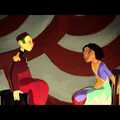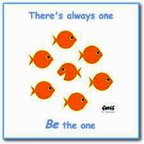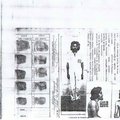2012.01.31. 22:34
Láss ezer csodát
„…a gyermek mint természeti lény eredendően jó, csak a társadalmi együttélés rontja meg. "Minden jó, amidõn kilép a dolgok alkotójának kezéből, de minden elfajul az ember kezei között"
Ez Jean-Jacques Rousseau pedagógiai elmélete. Én ebben hiszek.
Ma úgy volt, hogy mennem kell dolgozni, az indiai étterembe. De aztán tulajdonosváltás problémák akadtak, mondták, hogy csak 7-kor nyitunk. Úgyhogy elmentem indiai ismerőseim lakására várakozni velük egy órát. Végül kiderült, hogy ki sem nyitunk ma. De még ott maradtam beszélgetni 2 órát, nemrég értem haza. Mindig szerencsésnek érzem magamat, amikor ilyen beszélgetésekbe kerülök bele. Belépsz egy lakásba, ahol 6 indiai fiú lakik együtt. Teljesen más kultúra, teljesen más gondolkodás. Indiai zene szól (ők szinte csak azt hallgatnak), hindi nyelven beszélgetnek melletted, más ételeket esznek. Nincs barátnőjük, a vallásuk pedig vagy hindu vagy muszlim, attól függően, melyik honnan jött.
És mielőtt folytatom, mindenki gondolkodjon el, mi jutott most eszébe, vajon milyen lehet ez a hely, milyenek ezek az emberek?
Kedvesek. Nem próbálkoznak be, nem csajoznak, egy feleségük van/lesz egy életben, és azt tiszteletben tartják (a legtöbb, persze vannak kivételek, nem mondom, hogy szentek, vagy ilyesmi). Megkínálnak étellel-itallal, és el kell fogadni, mert rossz néven veszik az elutasítást, mivel szívből adják. Akár még főzni is nekiállnak ott helyben. Elbeszélgettünk az európai és az indiai kultúra különbségeiről, hogy melyikben mi a „rubbish”.:) Őszintén beszélnek az élet nehézségeiről, hogy honnan jöttek, hogyan gondolkodnak, miben hisznek. Isten számukra nem csak egy szó, hanem tényleg hisznek. Én európai vagyok. És szabad. Fizikailag, és lelkileg. Utazgathatok, dolgozhatok, és ha akarom, kétnaponta másik pasival jöhetek össze. Más kérdés, hogy ezt nem akarom, de ha akarnám, megtehetném, és a kutya sem törődne vele, senki nem ítélne el, mert a világ nagy, és nem is tudnának egymásról. Közülük sokan illegálisan vannak itt, vagyis nem utazhatnak, azaz, ha elhagyják az országot, nem jöhetnek vissza. Úgy házasodnak, hogy nem is ismerik a leendő házastársat, csak kapnak egy fényképet. Mégis kitartanak egy életre. És mit mondunk mi erre? Úristen, micsoda maradiság, szörnyű, nincsenek 100%-osan tiszta emberi jogok, szabadság… és mégis boldogok. De hogyan? Mert a dolgok pozitív oldalát nézik, keresik a boldogságot. Megtalálják a jót a dolgokban.
Persze, amiket itt írok, nagy százalékban igaz, de nem 100%-ban, van, aki utazhat, van, aki nyitott felfogású, és házasodhat akárkivel, és persze vannak, akik csajoznak is, stb. De azért nagyrészt igaz, főleg azokra, akik otthon élnek, szigorúbb szabályok szerint, mint mi. Mert ugye akik eljöttek, azokat már megcsapta a nyugati kultúra szele.
Ha az ember előítélet nélkül fordul valaki felé, akkor az a valaki megnyílik. Így lehet akárkivel, akárhonnan jött, jót beszélgetni. Ez rám is igaz, és mindenki másra. Amióta eljöttem, sok érdekes emberrel találkoztam itt. Annyira különbözőek vagyunk, a színünk, a kultúránk, a vallásunk, a gondolkodásunk.
Szeretnék eljutni Indiába és Afrikába is, hogy ne csak halljam, hanem lássam is az életet ott. Remélem, el is fogok. De nem tengerparti lazsálásra, hanem belenézni egy kicsit az emberek életébe, megismerni a szokásaikat, a mindennapjaikat. Van egy új
Travelling differently
I realized very early ont hat, for me, travelling was the best way of learning. I still have a pilgrim soul, and I thought that I would pass on some of the lessons I have learned, in the hope that they might prove useful to other pilgrims like me.
- Avoid museums. This might seem to be absurd advise, but let’s just think about it a little. If you are in a foreign city, isn’t it far more interesting to go on in search of present than the past? It’s just that people feel obliged to go museums because they learned as children that travelling was about seeking out that kind of culture. Obviously, museums are important, but they require time and objectivity – you need to know what you want to see there, otherwise you will leave with a sense of having seen a few really fundamental things, but can’t remember what they were.
- Hang out in bars. Bars are the places where life in the city reveals itself, not in museums. By bars I don’t meen discotheques, but the places where ordinary people go, have a drink, ponder the weather, and are always ready for a chat. Buy a newspaper and enjoy the ebb and flow of people. If someone strikes up a conversation, however silly, join in: you cannot judge the beauty of a particular path just by looking at the gate.
- Be open. The best tour guide is someone who lives in the place, knows everything about it, is proud of his or her city, but does not work for agency. Go out into the street, choose the person you want to talk to, and ask them something (Where is the catedral?). if nothing comes out of it, try someone else – I guarantee that by the end of the day you will have found yourself an excellent companion.
- Try to travel alone or – if you are married – with your spouse. It will be harder work, no one will be there taking care of you, but only this way can you truly leave your own country behind. Travelling with a group is a way of being in a foreign country while speaking your mother tongue, doing whatever the leader of the flock tells you to do, and taking more interest in group gossip than in the place you are visiting.
- Don’t compare. Don’t compare anything – prices, standards of hygiene, quality of life, means of transport, nothing! You are not travelling in order to prove that you have a better life than other people. Your aim is to find out how other people live, what they can teach you, how they deal with reality and with the extraordinary.
- Understand that everyone understands you. Even if you don’t speak the language, don’t be afraid. I’ve been in lots of places where I couldn’t communicate with words at all, and I always found support, guidance, useful advice, and even girlfriends. Some people think that if they travel alone, they will set off down the street and be lost for ever. Just make sure you have the hotel card in your pocket and – if the worst comes the worst – flag down a taxi and show the card to the driver.
- Don’t buy too much. Spend your money on things you won’t need to carry: tickets to a good play, restaurants, trips. Nowadays, with the global economy and the internet, you can buy anything you want without having to pay excess baggage.
- Don’t try to see the world in a month. It is far better to stay in a city for four or five days than visit five cities in a week. A city is like a capricious woman: she takes time to be seduced and to reveal herself completely.
- A journey is an adventure. Henry Miller used to say that it is far more important to discover a church that no one else has ever heard of than to go to Rome and feel obliged to visit the Sistine Chapel with two hundred thousand tourists bellowing in your ear. By all means go to the Sistine Chapel, but wander the streets too, explore alleyways, experience the freedom of looking for something – quite what you don’t know, but which, if you find it, will, you can be sure, change your life.
Nagyjából ezeket gondolom én is, bocs, hogy angolul van, de itt nem lehet magyar nyelvű könyvet kapni, fordítgatni meg nincs most kedvem. De nem túl bonyolult szöveg, mindenki megérti, biztos vagyok benne, aki meg nem, az használja a webfordítót.:)
Remélem, érdekes volt, hamarosan újra ugyanitt. Most megnézem az interneten a Barátok köztöt, mert a sok okosság után szüksége van az agyamnak egy kis butításra is. :)
Ezt kívánom mindenkinek, aki olvassa a blogomat (ami a dalban van). Nem vagyok oda az indai zenéért, de ezt az egyet szeretem.
A bejegyzés trackback címe:
Kommentek:
A hozzászólások a vonatkozó jogszabályok értelmében felhasználói tartalomnak minősülnek, értük a szolgáltatás technikai üzemeltetője semmilyen felelősséget nem vállal, azokat nem ellenőrzi. Kifogás esetén forduljon a blog szerkesztőjéhez. Részletek a Felhasználási feltételekben és az adatvédelmi tájékoztatóban.




